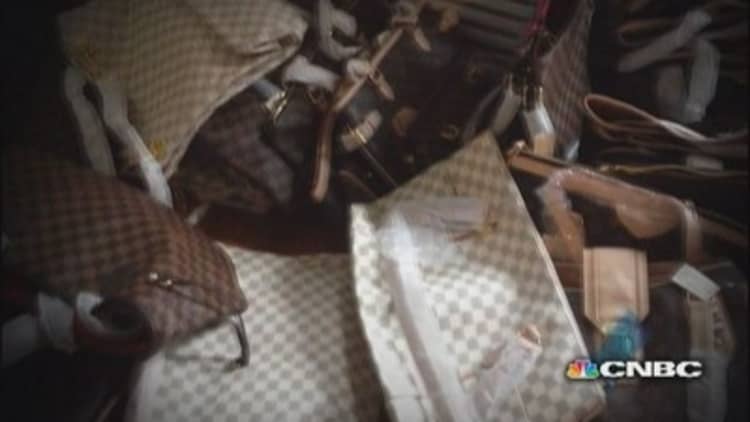
With fans flocking to New York and New Jersey for Sunday's Super Bowl, organized crime wants a piece of the action. Counterfeiters are busy smuggling fake jerseys, hats and more into the hands of consumers looking for a discount, investigators say.
"Everybody in this city is trying to use the Super Bowl to make some money. Why wouldn't the counterfeiters be doing the same?" said Marc Misthal, an attorney and shareholder with Gottlieb, Rackman & Reisman, a law firm that specializes in intellectual property law.
Law enforcement officials this week arrested two people and seized counterfeit game tickets that could shockingly get through ticket scanners. "First time I've ever seen a ticket that was counterfeit that would actually get you into an event. ... These are clearly the best quality counterfeit we've ever seen," said James Hayes, special agent in charge of Homeland Security Investigations in New York.
Authorities this week have seized more than 100 fake tickets, including 30 Super Bowl tickets, a parking pass and tickets to some events related to the big game, Hayes said.
(Read more: The economics of Super Bowl tickets: TiqIQ CEO)

Stopping counterfeit Super Bowl goods is a joint effort by law enforcement in New York and New Jersey, Customs and Border Protection, Homeland Security Investigations and the National Football League.
"With the Super Bowl there is an uptick in counterfeit Super Bowl items," said Bill Rivera, a Customs and Border Protection branch chief at the JFK International mail facility. There, packages from China have been seized. "In the last couple of days, we've intercepted a large number of counterfeit jerseys and hats, destined…for MetLife stadium," Rivera said.
Customs and Border Protection looks for clues that items are counterfeit. With the fake jerseys, officers noticed uneven stitches, use of cheap plastic and missing holograms, Rivera said.
Another clue to knockoffs? The shipment of goods originated in China. "Eighty-five percent of the counterfeited items that come into the United States are from China," said Rivera. And if the tag says '"Made in China," the jersey is fake as no officially licensed jerseys are made in that country.
The agency also is watching for goods coming by sea into U.S. ports, including Newark, N.J. At a warehouse CNBC recently visited, agents inspected shipments for counterfeit Super Bowl goods.
(Read more: Behind the billion-dollar counterfeit bag market)
On the street, law enforcement and the NFL are working to stop counterfeit good sales. CNBC observed undercover agents from Homeland Security as they went to vendor stands in Times Square and asked if they were selling Super Bowl merchandise.
Counterfeiters also work online platforms and charge more for fake goods to make consumers think the items are real. Internet-based merchants may charge $150 for a jersey that retails for $250 so that the consumer thinks it's actually real, said Valerie Salembier, president and chief executive of the Authentics Foundation, a nonprofit group that fights counterfeiting. About 4,200 websites selling fake merchandise were shut down right before the 2013 Super Bowl, she said.
While counterfeiters try to cash in to the Super Bowl, it's all part of a larger $650 billion global business, according to Salambier. And it's not just the size that's troublesome. "One question to ask is where the money from all this is going?" Misthal said.
(See more: Are these bags real or fake?)
"So you're putting Americans out of work, you're hurting the industry 'cause the trademark holders are suffering, because they're not selling the actual authentic items. ... So you're actually helping to fund criminal enterprises, and the proceeds from those criminal enterprises could be funneled anywhere," Rivera said.
Salembier also worries about laborers who make counterfeit items. "If you tell people ... that they are supporting child labor, by their [counterfeit] purchase they often change their attitudes."
Here are some tips to make sure the Super Bowl merchandise is legitimate:
- Buy from the NFL or from a reputable store. If buying from a flea market, look for a license
- Ask the merchant if the item is real.
- Look for a hologram on the tag.
- Make sure jerseys do not say "Made in China."
- Touch the merchandise to ensure it feels like high quality.
- Check that stitching and labels are straight.
- Watch for misspellings.
—By CNBC's Jennifer Schlesinger and Andrea Day. Follow Schlesinger on Twitter @jennyanne211 and Day @AndreaDay. Follow the team on Twitter @CNBCinvestigate



